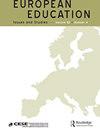COVID-19与哈萨克斯坦女教师:影响心理健康因素的实证研究
IF 0.9
Q4 EDUCATION & EDUCATIONAL RESEARCH
引用次数: 0
摘要
摘要本研究以哈萨克斯坦为例,探讨中亚地区新冠肺炎疫情前和新冠肺炎疫情期间影响女中小学教师心理健康的压力和组织气候因素。定量实证研究的结果表明,大流行导致女教师感到焦虑和抑郁的人数增加。城市女教师的焦虑和抑郁程度高于农村女教师。适度交互预测因子表明,随着物质技术安全水平和技术资源获取水平的提高,感知压力的负面影响减弱。在2019冠状病毒病的情况下,当女教师在工作中拥有更好的社会氛围时,物质技术安全/获得技术资源对心理健康的影响就会变得显著。如果女教师根据参与式管理政策更多地参与决策过程,制定明确的组织目标,如果女教师更频繁地收到绩效反馈,那么这种做法对心理健康的影响就会变得显著。本文章由计算机程序翻译,如有差异,请以英文原文为准。
COVID-19 and Kazakhstani Women Teachers: An Empirical Study of Factors Affecting Mental Health
Abstract The study investigates stress and organizational climate factors affecting mental health of women school and university teachers in pre‐COVID‐19 and COVID‐19 periods in the context of Central Asia considering the case of Kazakhstan. The results of quantitative empirical study show that the pandemic has caused an increase in perceived anxiety and depression among women teachers. Women teachers in urban areas experienced greater anxiety and depression than rural teachers. The moderation interaction predictor indicates that the effect of perceived stress becomes less negative with increased level of Material and Technical Security or Access to Technological Resources. In conditions of COVID-19 the effect of Material Technical Security/Access to Technological Resources on Mental Health becomes significant when women teachers have a better Social Climate at work. Its effect on Mental Health becomes significant when women teachers are more engaged in the decision making process with clearly defined organizational goals according to the Participatory Management policy and when women teachers more frequently receive Performance Feedback.
求助全文
通过发布文献求助,成功后即可免费获取论文全文。
去求助
来源期刊

European Education
EDUCATION & EDUCATIONAL RESEARCH-
CiteScore
1.20
自引率
0.00%
发文量
5
期刊介绍:
uropean Education is published in association with the Comparative Education Society in Europe (CESE). It is an international peer-reviewed journal devoted to original inquiries and dialogue on education across the member states of the Council of Europe. Established in 1969, the journal features articles on education in individual member states, comparative studies on education across Europe, as well as the impact of European education initiatives globally. The journal especially encourages theoretical and empirical studies, interdisciplinary perspectives, and critical examination of the impact of political, economic, and social forces on education. European Education includes reviews of books and educational films, including those published/produced in English and other languages.
 求助内容:
求助内容: 应助结果提醒方式:
应助结果提醒方式:


